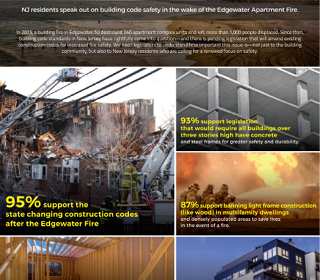In advance of last month’s 7 joint hearing by the state of New Jersey and Borough of Edgewater, N.J., to consider rebuilding the burned-down Avalon at Edgewater apartment complex with the same lightweight wood-frame construction method in it original specs, Build with Strength, a coalition of the National Ready Mixed Concrete Association, released a poll that found registered Garden State voters are very supportive of the state making changes to construction codes in the wake of the fire. In fact, ninety-five percent of respondents concur with such measures.
“The Edgewater fire should serve as a catalyst for change to strengthen our building codes and fire prevention efforts. We can’t wait for another tragedy where lives may be lost,” said Edgewater Assemblyman John Wisniewski, chairman of the New Jersey Fire Safety Commission.
The January 2015 fire that destroyed the 240-unit apartment building burned for seven hours and left 500 people homeless. Ironically, the same apartment complex burned down 15 years prior, while it was still under construction using the same wood-frame methodology. The two fires are considered the worst in Bergen County’s history.
“New Jersey residents have already experienced firsthand the consequences of building with vulnerable and inferior construction materials,” adds Build with Strength spokeman Kevin Lawlor. “The devastation wrought by the Edgewater fire has been burned into the collective memory, and as such, there’s overwhelming consensus to enact whatever measures are necessary to make sure something like this never happens again. That means code requirements for structures to be built with resilient products like concrete, and not wood.”
According to the poll, New Jersey voters overwhelmingly support legislative changes to make buildings in the state more resistant to fires and natural disasters. This includes support for a requirement for concrete and steel frames for buildings over three stories high, as well as proposed legislation that would place limits on construction with wood.
“Any consideration of rebuilding the Avalon apartment complex with lightweight wood-framing a third time must be met with incredulity,” Lawlor observes. “Apparently the old adage, ‘fool me once, shame on you, fool me twice, shame on me,’ has been willfully ignored. The representatives on the zoning board and council as a whole should follow their constituents’ near-unanimous position on safe building construction, and reject efforts to utilize materials that put the community at risk.”
The city council hearings continue this month, on the heels of the developer’s outlining of a rebuilding plan at the September meeting, which included a more comprehensive sprinkler system and concrete masonry firewalls, running up to 30 inches over the roof, to accompany a wood framing system similar to its predecessor.
